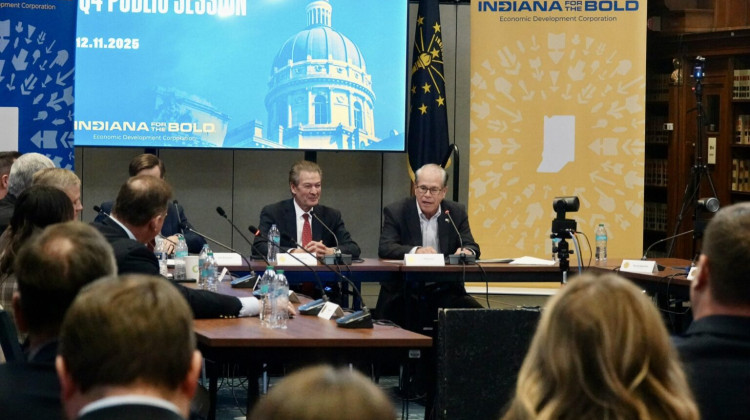
The Senate Rules Committee advanced the abortion ban bill to the full Senate by a vote of 7-5, with one Republican joining Democrats in voting against it.
Brandon Smith/IPB NewsIndiana Senate Republicans added further restrictions to their proposed abortion ban Tuesday.
The measure, SB 1 (ss), bans abortions except in cases of rape and incest and when the life of the pregnant person is at risk.
But a Senate committee changed the rape and incest exception. Now, an abortion could only be performed if the pregnancy is less than eight weeks “post-fertilization.” If the pregnant person is younger than 16 years old, then they can access abortion in the cases of rape and incest up to 12 weeks after fertilization.
Democrats, like Sen. Tim Lanane (D-Anderson), called those time limits arbitrary.
“If you’re wanting to basically say you can’t get an abortion if you’re raped, this is probably the way to do it,” Lanane said.
READ MORE: Indiana Senate lawmakers begin special session with testimony on abortion ban
Join the conversation and sign up for the Indiana Two-Way. Text "Indiana" to 73224. Your comments and questions in response to our weekly text help us find the answers you need on statewide issues.
Democrats questioned Sen. Sue Glick (R-LaGrange), the bill’s author, about the time limits. She said 12 weeks is soon enough for a 16-year-old rape or incest victim to know they’re pregnant.
“You have to also understand, they’ve been through a traumatic experience," Glick said. "So, they should have, at that point, reported it to someone.”
That runs contrary to expert testimony lawmakers heard during the committee hearing.
The committee made two other changes to the bill. One would ensure that when a doctor terminates a pregnancy because the fetus can’t survive outside the womb – one of the only kind of abortions the measure would allow – it must be reported like any other abortion.
The other change Republicans approved affects affidavits pregnant people must sign if they want an abortion in cases of rape or incest. The amendment requires that affidavit to be included in the person’s permanent health record, which critics worry could make it less confidential.
Democrats proposed two amendments that were rejected by Republicans. One would allow abortion care via telehealth, which is already banned by Indiana law. The other would extend life insurance, child care support and child tax deductions to cover a fetus, during any stage of development.
But Democrats also had several other proposed amendments, which committee chair Sen. Rodric Bray (R-Martinsville) refused to hear. Bray noted he also didn’t hear some Republican-authored amendments.
“Our goal here is to get something through the committee that we can get onto the floor and have a debate and continue to have this idea moving,” Bray said.
The committee took more than six hours of testimony and heard from 61 different people – none of whom supported the bill.
“Nobody wants this bill,” Sen. Tim Lanane (D-Anderson) said. “Now, I understand: the anti-choice people think it’s too lenient. The pro-choice people – and I identify with them – this takes away your rights.”
Even the measure’s author, Glick, said she’s not happy with it.
“It has some strong points; it has some weak points,” Glick said. “However, this is the first step in a long process.”
One Republican – Sen. Mark Messmer (R-Jasper) – joined Democrats in voting against committee passage of the measure. Messmer said every anti-abortion organization that contacted him about the legislation urged him to vote no because the bill doesn't go far enough in banning abortion.
Two other Republicans – Sen. Ed Charbonneau (R-Valparaiso) and Sen. Eric Bassler (R-Washington) – voted for it but expressed serious reservations.
“There are many reasons not to support this bill, on many different levels,” Bassler said.
Both he and Charbonneau indicated that, without significant changes, they likely wouldn’t vote to pass the measure out of the Senate.
The bill is now headed to the full Senate, which is scheduled to consider further amendments Thursday.
This story has been updated.
Contact reporter Brandon at bsmith@ipbs.org or follow him on Twitter at @brandonjsmith5.
 DONATE
DONATE








 Support WFYI. We can't do it without you.
Support WFYI. We can't do it without you.